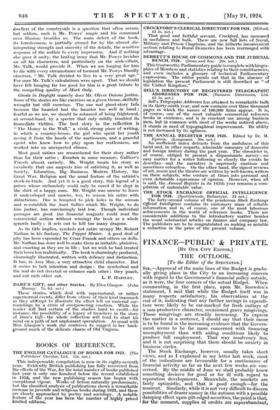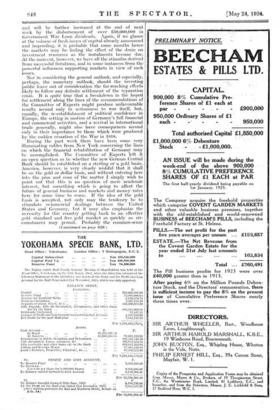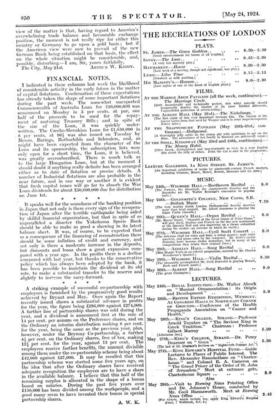FINANCE-PUBLIC & PRIVATE.
[BY OUR CITY EDITOR.]
THE OUTLOOK.
[To the Editor of the SPECTATOR.] SIR,—Approval of the main lines of the Budget is graclu, ally giving place in the City to an increasing concern with regard to the Government's financial policy outside, as it were, the four corners of the actual Budget. When commenting, in the first place, upon Mr. Snowden's statement, I said that while the Budget itself was in many respects satisfactory, his observations at the end of it, indicating that any further savings in expendi- ture were likely to be ear-marked for fresh outlays of a non-productive character, occasioned grave misgivings. Those misgivings are steadily increasing. To express the matter in a sentence, I should say that their cause is to be found in the increasing evidence that the Govern- ment seems to be far more concerned with financing unemployment than with aiding conditions likely to produce full employment. That way insolvency lies, and it is not surprising that there should be anxiety in business circles.
The Stock Exchange, however, usually takes short views, and as I explained in my letter last week, most of the indications are favourable for a continuance of financial activity so far as the next few weeks are con- cerned. By the middle of June we shall probably know something decisive for good or for ill with regard to reparation developments. Meanwhile, the markets are fairly optimistic, and that is good enough—for the moment. Similarly, while it is not very difficult to discern possibilities of dearer money in the autumn with a possible- damping effect upon gilt-edged securities, the point is that, for the moment, supplies of credits are superabundant, and will be further increased at the end of next Week by the disbursement of over £50,000,000 in Government War Loan dividends. Again, if we glance at the volume of fresh issues of capital already announced and impending, it is probable that snme months hence the markets may be feeling the effect of the drain on investment resources as the instalments become due. At the moment, however, we have all the stimulus derived from successful flotations, and in some instances from the powerful influences supporting markets in view of such issues.
Nor in considering the general outlook, and especially, perhaps, the monetary outlook, should the investing public leave out of consideration the far-reaching effects likely to follow any definite settlement of the reparation crisis. It is quite true that a breakdown in the hoped for settlement along the lines of the recommendations of the Committee of Experts might produce unfavourable results second only in seriousness to war itself, but, equally, the re-establishment of political confidence in Europe, the setting in motion of Germany's full financial and commercial activities, and a revival in international trade generally, might also have consequences second only in their importance to those which were produced by the sudden cessation of the War in 1918. During the past week there have been some very illuminating cables from New York concerning the lines on which the financial rehabilitation of Germany may be accomplished. The _Committee_ of Experts left , it an open question as to whether the new German Central Bank should be established on a sterling or a gold basis. America, however, is very clearly wishful that it shall be on the gold or dollar basis, and without entering here into the pros and cons of the matter I simply wish to point out that this is no question of mere academic interest, but something which is going to affect the future of general business and markets and money rates here for some time to come. If the idea of the gold basis is accepted, not only may the tendency be to stimulate commercial dealings between the United States and Germany, but it may also emphasize the necessity for this country getting back to an effective gold standard and free gold market as quickly as cir- cumstances may permit. Probably the common-sense
(ConIgnued on pace 80)
view of the matter is that, having regard to America's overwhelming trade balance and favourable exchange position, the moment is not really ripe for either this country or Germany to go upon a gold basis ; but if the American view were now to prevail of the new German Bank being established on that basis, the effect on the whole situation might be considerable, and, possibly, disturbing.-I am, Sir, yours faithfully,












































 Previous page
Previous page